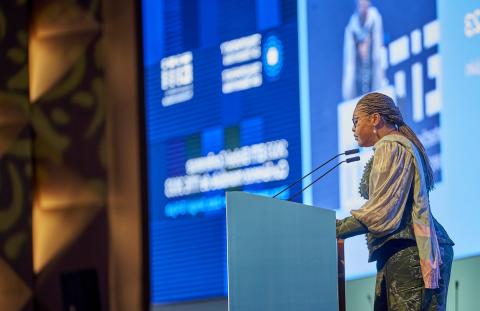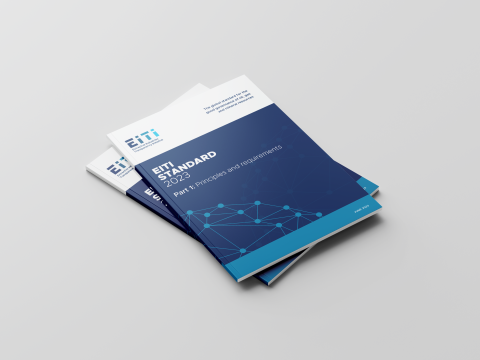
Resource governance in transition
Ahead of the EITI’s 20th anniversary, Mark Robinson reflects on the organisation’s past, present and future.
This is a milestone year for the EITI. In June, we will celebrate the organisation’s 20th anniversary and 10 years since the EITI Standard was established. It is therefore a good moment to reflect on the progress that has been made in strengthening transparency and governance in the energy and extractives sector since the organisation was founded, and on the priorities and challenges that multi-stakeholder governance of the sector might address in the coming decade.
Making transparency the norm
The EITI was built upon on the premise that a country’s natural resources belong to its citizens. The objective of the EITI was to create an internationally accepted standard for extractive sector transparency, encapsulated in the EITI Principles developed in 2003 and the first EITI Standard in 2013. The motivation for creating the EITI lay in the recognition that strengthened transparency of natural resource revenues can reduce corruption, and that revenues from the extractive industries can transform economies and raise the living standards of citizens in resource-rich countries.
The EITI has since evolved to become a global standard for transparency and accountability in oil, gas and mining. The organisation has grown substantially since its inception, from an initial group of 20 countries to nearly 60 implementing the EITI Standard today. Its reach continues to grow, with Angola becoming the latest country to sign up last year and other resource-rich countries keen to join. Nearly 70 companies now support and commit to the Expectations for EITI supporting companies, including leading multinationals and major state-owned enterprises in the energy and extractives sector. Hundreds of international and local civil society organisations are actively engaged across a range of EITI countries and resource governance issues. More than 1,000 representatives from government, industry and civil society take part in multi-stakeholder groups in EITI implementing countries.
In the past two decades the EITI has made substantial progress towards its underlying objective, as evidenced by a recent independent evaluation. The study found that the very existence of the EITI – grounded in a multi-stakeholder approach – is valuable in itself, and that the EITI remains relevant and aligned with national priorities. Substantial progress has been made in deepening transparency across 57 implementing countries with a wide range of extractive industries, political systems and geographies.
Renewing commitments in a rapidly evolving context
Commitments to transparency and to building an open and accountable extractive sector are at the heart of how the EITI operates. Today, transparency remains as important as ever, especially as the extractive and energy sectors face a rapidly evolving context with steady growth in the renewables sector and escalating demand for critical minerals. Yet weak governance and corruption remain significant challenges as the sector continues to evolve. Political commitment to strong and transparent government systems are necessary to ensure that the sector contributes to sustainable development and generates revenues for infrastructure, jobs and public services. Civic space is integral to ensure that multi-stakeholder groups can foster open public debate on thorny governance issues. These fora need to be open and inclusive, creating more opportunities for women, youth and local communities to participate.
Nearly ten years since it was first introduced, the EITI Standard continues to evolve. Refinements to the 2019 EITI Standard are currently under discussion by the EITI Board to ensure that the reporting framework remains relevant and responds to a rapidly evolving context. EITI reporting is increasingly informing decision-making, fostering independent analysis and promoting public debate, through open data that is more timely, usable and accessible.
Consolidating progress on the EITI's strategic shifts
Acknowledging the changing nature of the landscape in the extractive sector, the EITI's Board agreed in 2020 on six strategic shifts and thematic priorities for the EITI. Not all countries will pursue these shifts at an equal pace; the EITI remains responsive to national priorities and to other areas of emerging interest from implementing countries. Yet the EITI’s 20th anniversary is an opportune moment to reinforce the EITI’s collective priorities, and to reflect on the role that the EITI can play to ensure that natural resources contribute to a future that benefits all citizens. The upcoming EITI Global Conference, taking place in Dakar in June 2023, will provide an opportunity for leaders from governments, companies and civil society to renew their commitment to greater transparency as the sector continues to evolve.
EITI strategic priorities
The EITI's six strategic priorities present targeted shifts in transparency and accountability to help focus our efforts from 2021 to 2023. These priorities outline key areas where the EITI can be used to improve extractive sector governance in a volatile and changing energy landscape, while remaining true to the principles that underpin the EITI’s work.





